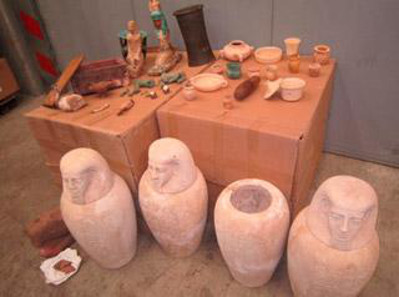February 12, 2015 – Thirty-five individuals have been arrested and 2,289 cultural artefacts seized, in an international operation supported by Europol to prevent the theft and trafficking of European cultural property.
Europe has a significant historical, artistic and culture heritage, which organised criminals groups are keen to exploit. In response, European law enforcement authorities in 14 countries (Bosnia and Herzegovina, Bulgaria, Cyprus, Croatia, France, Germany, Greece, Ireland, Italy, Portugal, Romania, Serbia, Spain, United Kingdom) launched Operation Aureus, which culminated in a week-long coordinated action to prevent the further looting, theft and illicit trafficking of cultural artefacts.
As part of the action week, law enforcement authorities carried out checks on 6,244 individuals, 8,222 vehicles, 27 vessels, as well as 2,352 inspections at antique and art dealers, auction houses and second-hand outlets. Checks were also stepped up at airports, land borders and ports, while information campaigns warned travellers about purchasing such objects. Specialised law enforcement units also performed checks on websites and online outlets suspected of selling cultural artefacts.
Speaking at a press conference, the Director-General of Guardia Civil and the General Director of the Ministry of Cultural Affairs confirmed that Spanish authorities had arrested five individuals, searched four properties and seized 36 Egyptian archaeological artefacts with a total value of between EUR 200,000 and 300,000. In addition mobile phones and various cash currency was confiscated, including EUR 10,000, during the action week which took place from 17-23 November 2014. The operation was named ‘Hieratica’ in Spain and was initiated by the Spanish Guardia Civil and the police of Cyprus.
Christian Jechoutek, Assistant Director at Europol, explained that Europol had supported Operation Aureus, which was part of the EU operational action plan against organised property crime, by conducting preparatory coordination meetings for the action, facilitating information exchange and providing intelligence to the participating countries. To support investigators on the spot, an experienced analyst, connected to Europol databases, was sent to the Guardia Civil command centre in Madrid.
The operation initiated 38 new investigations, with more expected. The operation’s development was also supported by Interpol, the United Nations Educational, Scientific and Cultural Organization (UNESCO) and the cultural authorities of the participating countries.
For more information go to the Europol website.





